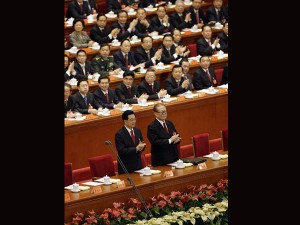China’s Hu calls for new economic growth model

Chinese President Hu Jintao, left, and former Chinese President Jiang Zemin arrive for the opening session of the 18th Communist Party Congress held at the Great Hall of the People in Beijing, China, Thursday, Nov. 8, 2012. Hu called for a new Chinese growth model, marked by greater domestic demand and private enterprise, to ensure the long-term health of the world’s second- largest economy. AP PHOTO/LEE JIN-MAN
BEIJING—President Hu Jintao called Thursday for a new Chinese growth model, marked by greater domestic demand and private enterprise, to ensure the long-term health of the world’s second- largest economy.
In a speech opening a pivotal Communist Party congress amid a slowdown in economic growth, Hu said China must recalibrate an export- and investment-led growth model increasingly seen as unsustainable.
“In response to changes in both domestic and international economic developments, we should speed up the creation of a new growth model and ensure that development is based on improved quality and performance,” he said.
Communist leaders including Premier Wen Jiabao – due to step down in March as part of the leadership transition – have long called for the country to rebalance its economy by fostering domestic consumer spending.
Proponents say that would help redress China’s swollen trade surpluses, which have irritated the West for years and cast the country as the foreign bogeyman of the just-concluded US presidential campaign.
But the economy is still heavily tilted toward export-led growth. And with Western markets reeling, China in the latest quarter posted its slowest rate of growth since the global financial crisis in 2009.
Economists said rebalancing the economy was imperative but would pose a tough test for Vice President Xi Jinping, set to take over as party chief when the congress ends next Wednesday.
In his address to more than 2,200 delegates at Beijing’s Great Hall of the People, Hu said China’s economy must be “driven more by domestic demand, especially consumer demand.”
“We should… unleash the potential of individual consumption,” he said.
Hu said China “must unswervingly encourage, support and guide the development of the non-public sector” and ensure that all enterprises can enjoy “a level playing field” no matter who their owners are.
He also said China will aim to “double 2010 GDP and per capita income” by the year 2020.
That would translate into annual growth in gross domestic product of around seven percent during that period. China’s 2012 economic growth target is 7.5 percent.
The economy averaged annual economic growth rates of more than 10 percent in the decade through 2010, fueled by cheap labor exports and heavy investment.
But the current economic model has started to fray amid pressure for higher wages and declining demand overseas due to the global slowdown.
In the three months through September this year, China notched its worst quarterly growth performance – 7.4 percent – since the first quarter of 2009.
Hu’s remarks on the economy were part of a wider report he gave as the party embarked on a once-a-decade leadership transition. It culminates next week with Xi’s ascent to the party leadership in place of Hu.
Xi would then replace Hu as president next March.
“Deepening reform is crucial for accelerating the change of the growth model,” Hu said.
However, he signaled continued state involvement in the economy, especially in sectors that “comprise the lifeline of the economy and are vital to national security”. No details were given.
He also said exports would remain an important part of the economy.
China’s rapid growth since it embarked on capitalist reforms more than three decades ago has lifted hundreds of millions of people out of poverty.
But it has also bred worsening problems such as ecological degradation and a widening rich-poor gap, both of which have fueled unrest.
“We must give high priority to making ecological progress,” Hu said.
Lian Ping, Shanghai-based chief economist for the Bank of Communications, said it was “truly important” to transform the growth model.
“We want to see economic growth more steady instead of more rapid, so as to alleviate pressure on the environment and resources.”
Yao Wei, economist with French bank Societe Generale in Hong Kong, said China’s tougher economic situation will be a test for Xi and make reforms more urgent.
“He has less options than in previous years and he’s under much greater pressure,” she said. “There is little room for stepping back.”